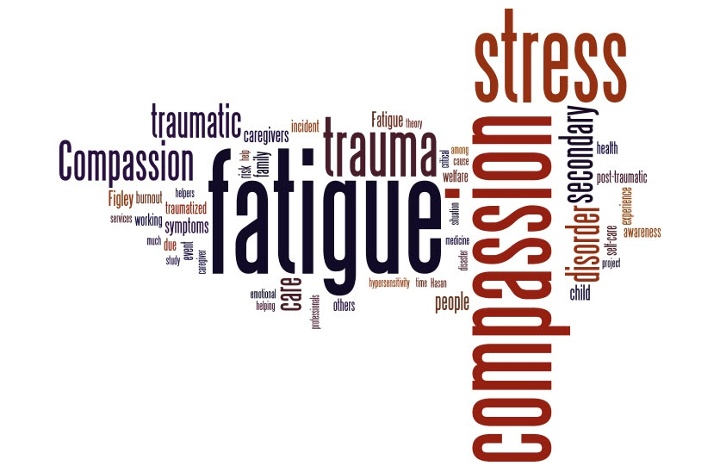Compassion Fatigue
Compassion fatigue is the opposite to compassion satisfaction and has been described as the “cost of caring” for others in emotional pain (Figley, 1982). The helping field has gradually begun to recognize that workers are profoundly affected by the work they do, whether it is by direct exposure to traumatic events (police, medical, veterinarian, teaching, legal, parents and caregivers; or secondary exposure (hearing clients talk about trauma they have experienced, helping people who have just been victimized, child protection workers, call centres, hospital and prison administration, family members, caregivers) and the full gamut in between such as working with clients, family who are chronically in despair or illness, witnessing people’s inability to improve their very difficult life circumstances or feeling helpless in the face of poverty and emotional anguish.
Compassion fatigue is a weariness of hearing the sad stories of others. It’s where you’ve been so compassionate for so long, that you feel burdened by what others have gone through and unable to change their circumstances. Most times, the client stirs up our personal stories, which are unresolved from our past. The roles of helping and caring, requires helping professionals to open their hearts and minds to their clients and patients – unfortunately, this very process of empathy is what makes them vulnerable to being profoundly affected and even possibly damaged by their work.
You can become completely overwhelmed by people’s experiences and take on their trauma and pain and feel the need to fix everything for them. Included are parents, carers, animal or human shelter volunteers, as compassionate fatigue can have an effect on us all, if we don’t take steps to prevent it or release it. All wanting the best for others while forgetting our needs.
The good news is that you can do something about compassion fatigue before it overtakes your health and wellbeing. Become aware of signs and symptoms before it leads to severe burnout.
Symptoms may include;
· Sleep disturbance, weight loss and headaches
· Chronic exhaustion, burning the candle at both ends
· Intrusive thoughts, emotional avoidance or numbness,
· Emotional insensitivity or hypersensitivity
· Overwhelming tears or anger after you see the person/s
· Feeling that your job is ‘unfair’, life is unjust,
· Personal relationship breakdown,
· Impaired decision-making,
· Reduced job satisfaction,
· Fear or dread of going to work,
· Depression, anxiety,
· Depersonalisation – a feeling of disconnection with yourself and needs,
· Their experiences stir your own unresolved story.
Make a daily practice of self-care and self-compassion
Self-care is essential to preventing burnout and compassion fatigue. It’s about reflecting on your work, your life, acknowledging you have done your best and then making time for yourself. Self-compassion is about looking after your own needs before you attend to someone else’s, ‘putting the oxygen mask on yourself before saving another.’ as the air hostess tells us!
Follow the five T’s daily;
1. Time to rest. Relax when you can, go to bed early and give your body permission to stop. Allow your body to do ‘nothing’, just enjoy.
2. Time to recover. Take that day off, take a trip somewhere other than your house. Do things that make you feel good. See a funny movie as laughter always helps break up the heavy feelings.
3. Time to renew. Make simple changes in your life that keep it feeling balanced, between work and home life. This can often be as simple as working out what to say “yes” to, and get used to saying ‘No’ to things that drains your energy. Have a social media detox for forty eight hours, getting used to your own needs.
4. Time to refresh. Do something fun now and then that fills your bucket of joy. Go out into nature, for a walk or just lay outside, taking in the energy of what nature has for us.
5. Time to release. Journal your negative thoughts, concerns and fears onto paper. Then each day write five things you are grateful for. Make this part of your daily routine and celebrate the results you receive.


